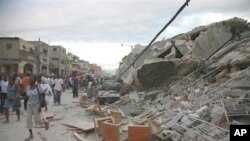The nation of Haiti is a mostly mountainous one, sharing the Caribbean island of Hispaniola with the Dominican Republic, east of Cuba.
Because of its location, Haiti's climate is tropical, its forests are lush and green, and its beaches are sprawling. All of this would seem to make the country an ideal spot for tourism. But years of political violence, corruption, deforestation, crime and natural disasters have severely hindered its development efforts.
Haiti also lies in the middle of the hurricane belt, making it subject to severe tropical storms during the Northern Hemisphere's summer season. Along with flooding, it also is vulnerable to periodic drought and occasional earthquakes.
In 2008, Haiti was devastated by four storms, which killed hundreds of people and wiped out 15 percent of the country's economic output. World Bank President Robert Zoellick estimated that the storms caused nearly $1 billion worth of damage.
Haiti is the hemisphere's poorest nation, with 70 percent of its 9.8 million people living on the equivalent of less than $2 a day. An estimated two million or more live in its capital Port-au-Prince, many of them in densely populated slums.
There is widespread unemployment and underemployment -- more than two-thirds of the labor force in Haiti has no formal job.
Former U.S. President Bill Clinton, the United Nations special envoy to Haiti, has been seeking to lure investors to do business in Haiti, despite its problems.
The nation recently celebrated the 206th anniversary of its independence from France, but long-standing political divisions remain a problem for the country's governance.
Haiti is Nation Plagued By Social Unrest, Poverty, Natural Disasters











